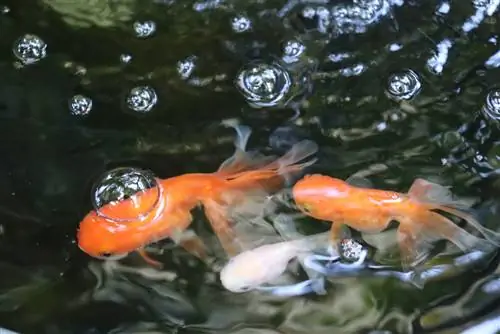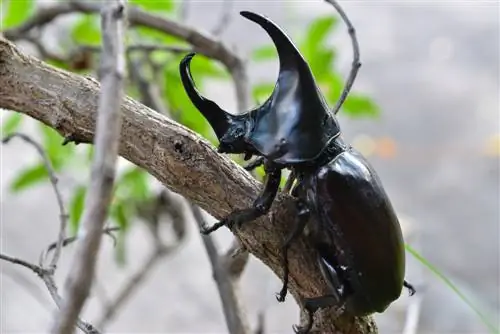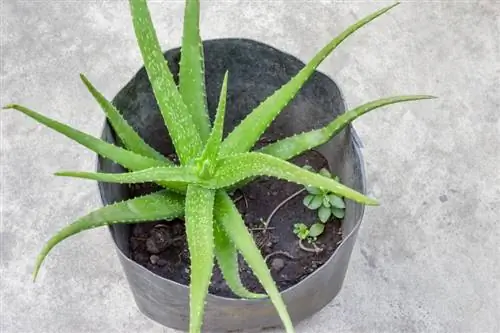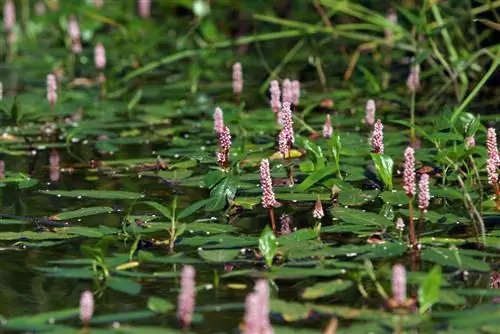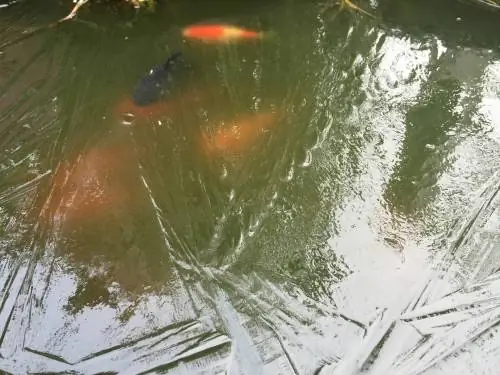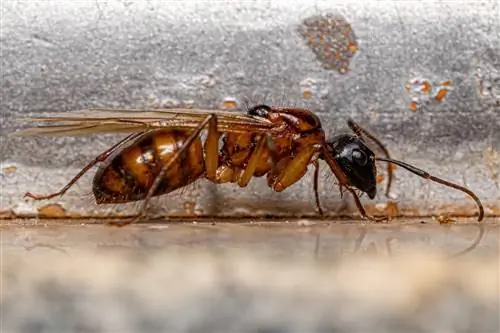- Author admin leonars@hobbygardeners.com.
- Public 2023-12-16 16:46.
- Last modified 2025-06-01 06:02.
What should you take into account when keeping goldfish in a pond appropriately? What do goldfish actually eat in the pond? How can goldfish overwinter in the pond? Are you thinking about important questions about the perfect goldfish pond? Read well-founded answers and useful tips for solving problems here.
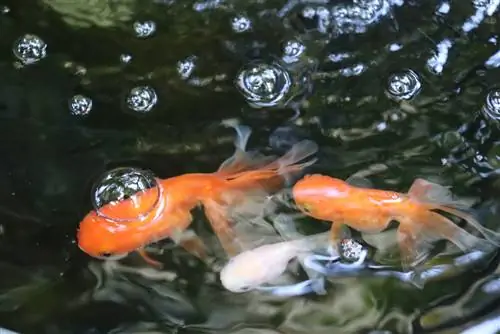
What conditions do goldfish need in the pond?
Goldfish in the pond need at least 2.000 liters of water, a depth of 1.20 m, a temperature of 20° Celsius and sufficient plants as well as accessories such as filters and pond aerators. They eat insects, amphibians and special food and can survive in the pond in winter if the depth is appropriate and there is no ice.
- Goldfish in the pond need: 2,000 liter size, 1.20 m depth, 20° Celsius temperature (4°-30°), pond plants, water filter and oxygen pump.
- Goldfish in the pond eat insects, frogs, spawn, amphibians, mosquito larvae and special goldfish food if necessary.
- Adult and young goldfish can overwinter in the pond if the ice cover does not freeze completely at a minimum depth of 1.20 m.
Goldfish pond in top form - what conditions?
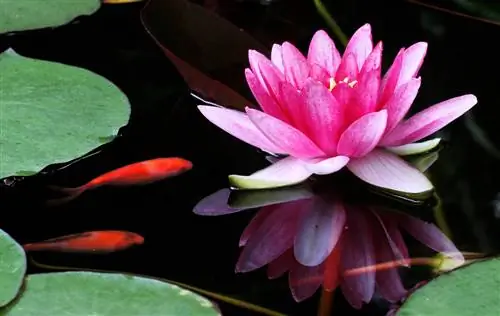
Goldfish are an enrichment for every garden pond
If goldfish had a say, they would advocate a sociable life in the garden pond. The robust schooling fish are slow swimmers who prefer to swim just below the surface of the water in search of food. A large, partially shaded pond surface with great hiding places is at the top of the wish list. The following table summarizes the basic conditions you can use to make goldfish happy in the pond and nip problems in the bud:
| Framework conditions | Mandatory |
|---|---|
| Size | 2,000 l |
| Depth | 1, 20 m (deepest point) |
| Water temperature | 20° (4° to 30°) |
| Number | 2-4 goldfish/m³ |
| Accessories | + Filters |
| + Pond aerator | |
| Planting | + Floating plants |
| + Underwater plants | |
| + Riparian plants |
Regardless of a pronounced preference for a sociable life, every goldfish needs a water volume of at least 200 liters, preferably 400 liters. Dense bank vegetation, decorative floating leaf plants and underwater plants offer opportunities to retreat and make an important contribution to water quality.
In the following video, an experienced hobby gardener presents his goldfish in the pond and gives numerous tips from his 15 years of experience:

Keeping goldfish in the pond - 10 questions and answers
The species-appropriate keeping of goldfish in the pond raises questions. You can read the 10 most frequently asked questions with compact answers here:
What do goldfish eat in the pond?
Goldfish are omnivores with a penchant for mosquito larvae, aquatic insects, spawn and other amphibians. If the natural food supply in the large pond is not sufficient, you should also feed the goldfish in the pond with special goldfish food, ideally supplemented with frosted red mosquito larvae from specialist retailers. This should be noted:
- When do you start feeding?: from temperatures of 8° to 10° Celsius
- How often do you feed?: every 2 to 3 days (the bigger the pond, the more often)
- How much to feed?: small portions that can be eaten within a few minutes
How can young goldfish overwinter in the pond?
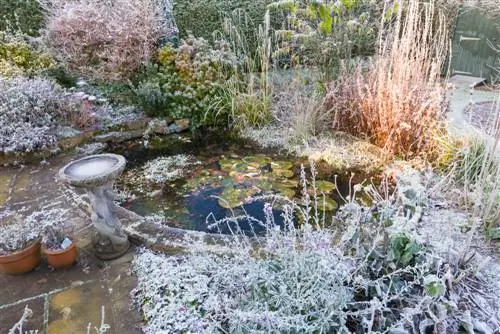
Goldfish can overwinter in the pond if it is deep enough and kept free of ice
If a garden pond is large and deep enough (from 120 cm), young goldfish can easily overwinter in it. Ice preventers or pond heaters prevent a closed ice cover from forming. This ensures the vital exchange of oxygen and fermentation gases.
How old do goldfish get in a pond?
If kept appropriately with a varied diet, goldfish in the pond can reach an age of 15 to 25 years.
Do goldfish need a filter in the pond?
Clean water is the lifeblood of goldfish. To prevent excrement, rotten plants and leftover food from accumulating, a filter in the pond is invaluable.
Can you keep koi and goldfish together in the pond?
The socialization of koi carp and goldfish has not proven successful in practice. Goldfish spawn a month before koi and develop rapidly. As a result, the koi fry are usually completely eaten by hungry goldfish. Better companions in the koi pond are golden orfs, which disdain spawning.
Do goldfish need oxygen in the pond?
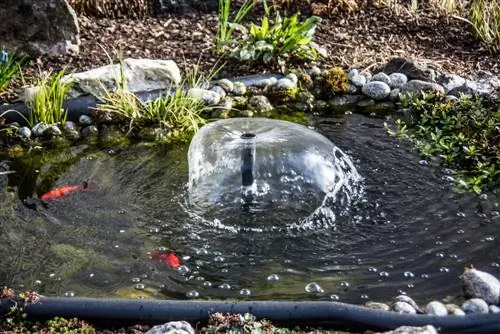
A fountain guarantees sufficient oxygen levels in the pond
At any time of the year, goldfish in the pond rely on a continuous supply of oxygen. The most common cause of death for goldfish is suffocation because a compact ice cover forms on the pond in winter and the oxygen supply comes to a standstill.
Does it work to keep goldfish in a pond without a pump?
If you give your goldfish a pond without an oxygen pump, the animals will fight for survival every day. The oxygen production from the aquatic plants used is too limited. By installing a pump (€104.00 on Amazon) in the pond, you can give your golden darlings a happy, he althy life.
What is a suitable hiding place for goldfish in the pond?
Green plants on land and in water serve as ideal hiding places for goldfish in the pond. A balanced combination of shore, floating and underwater plants is recommended:
- Shore, shallow water plants: Marsh iris (Iris pseudacorus), fever clover (Menyanthes trifoliata)
- Floating plants: Water lily (Nymphaea), Floating pondweed (Potamogeton natans)
- Underwater plants: Rough hornwort (Ceratophyllum demersum), needlewort (Eleocharis acicularis)
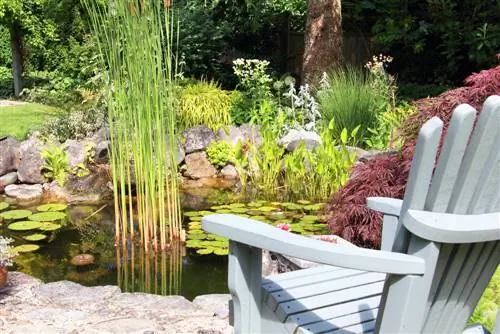
Goldfish need plants to hide
Do sticklebacks and goldfish get along in the pond?
Everything in the pond is basically eatable for goldfish, including sticklebacks swimming around. Over time, word gets around in the school of goldfish that this food has spines that scratch terribly in the throat. Of course, the learning process extends over a long time and dramatically decimates the stickleback population.
Do frogs and goldfish get along in the pond?
Living with goldfish doesn't end well for frogs. As omnivores, goldfish eat whatever they can fit in their mouths. For a 30 to 40 centimeter goldfish, an innocent little frog is just the right bite-sized snack.
Excursus
Reproduction in the goldfish pond
In the goldfish school, there are rough breeding practices. As soon as the water temperatures rise in spring, mating begins. The females simply release fertilized eggs into the water and no longer care about them. Baby goldfish need careful attention. Adult goldfish are spawning predators that mercilessly prey on their brood. For this reason, shallow water zones with fine-feathered aquatic plants are vital hiding places for small goldfish in the pond.
Solving problems - 10 questions & answers
Life pulsates in the goldfish pond with all the imponderables that an ecological system can bring with it. Problems arise out of the blue that require a timely solution. Below you can read tried-and-tested answers to ten typical problem questions:
Goldfish only swim at the top and gasp for air at the surface. What to do?
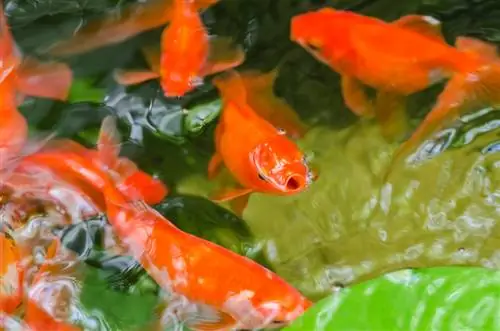
If the goldfish are constantly gasping for air, they are lacking oxygen
Acute oxygen deficiency causes goldfish to desperately gasp for air. As an immediate measure, please add as much fresh water as possible. Use a pond aerator or pump to permanently enrich the water with oxygen.
Why do my goldfish only swim at the bottom?
If herons regularly visit the pond, frightened goldfish prefer to stay on the ground. Furthermore, various diseases in goldfish cause this atypical behavior.
Goldfish chase each other all day long. What does that mean?
This behavior indicates that there will soon be a lot of baby goldfish in the pond. Part of the ritual of reproduction is that goldfish hunt each other.
Goldfish in the pond swim diagonally. Are you sick?
Yes, because swimming problems are a typical symptom of illness. The spectrum extends from parasite infestations to bacterial infections to widespread swim bladder inflammation. For an expert diagnosis, please consult your trusted veterinarian.
Why do my goldfish keep hiding?
Young goldfish use this method to find safety from their adult counterparts so as not to be eaten. If herons and other fish predators regularly pass by the pond, the entire swarm hides under floating and swamp plants as a precaution.
Can goldfish starve in a pond?
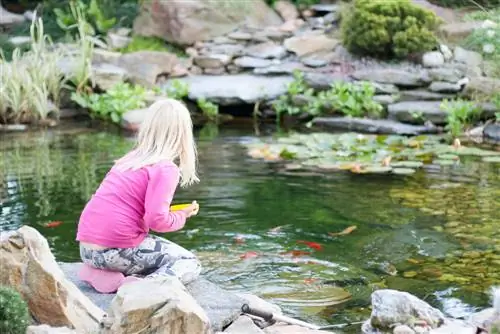
Goldfish should be fed regularly
In a large pond, insect influx, spawning and amphibians alone do not cover the food requirements. Small, shy goldfish can then starve because their large, cheeky counterparts eat everything. By supplying the school with fish food every two to three days, no goldfish will have to complain about a growling stomach.
Many goldfish are gone. What happened?
If the goldfish population in the pond was greatly reduced, the heron was there. It cannot be ruled out that great egrets, little egrets or night herons also helped themselves to the fish supply.
What problems require a temporarily higher s alt level in the pond?
If goldfish in the pond suffer from illnesses, a temporarily higher s alt content can be beneficial. However, s alt is not a panacea for sick goldfish. S alt baths work wonders for parasite infestations. If other diseases are rampant, a higher s alt content can slow down the effectiveness of prescribed medication. Please ask a specialist veterinarian for further information.
Goldfish jumping in the pond. What is the reason?
Goldfish, plagued by severe itching, jump around in the pond. The main cause is annoying parasites such as flukes. Other triggers for the unusual behavior include an acute lack of oxygen or a particularly stormy mating ritual.
Suddenly there are dead goldfish in the pond. Why do the fish suddenly die?
Various causes can be responsible for a sudden fish death in a goldfish pond. We have compiled the most common triggers below:
- Lack of oxygen due to summer heat with more than 30° Celsius
- Illnesses such as ascites or white spot disease (ichthyo)
- Poisoned water due to copper pipes, increased nitrate levels (over 30 mg/l) or too high a pH value greater than 7
Frequently asked questions
Why don't my goldfish in the pond come to the surface?
If goldfish can no longer be seen on the surface of the pond, please check the water quality. If the values are OK, lie in wait for a few hours. It is very likely that you will catch a heron in the act, which will scare your goldfish so much that they prefer to stay on the ground.
We have too many goldfish in the pond. How to get rid of the excess fish?
As a rule, it is necessary to largely empty the pond. You can gently catch the excess goldfish with a fish landing net. Ideally, you should give the pretty ornamental fish away or relocate them somewhere else. In this matter, please act according to your personal discretion and for the benefit of the goldfish.
Goldfish in the pond no longer eat. Can they starve?
When goldfish stop eating in the pond, winter is usually just around the corner. From temperatures below 10° Celsius, the ornamental fish eat a zero diet until spring. The survival artists cannot starve during this time.
Tip
If a plant island sways gently on the surface of the water, goldfish benefit from the decorative oxygen plus. When planting, priority is given to green lightweights among the aquatic plants, such as frog spoons or dwarf rushes. The long roots remove nutrients from the water and prevent algae infestation. Goldfish find an ideal hiding place and protection from the blazing summer sun under the plant island.

